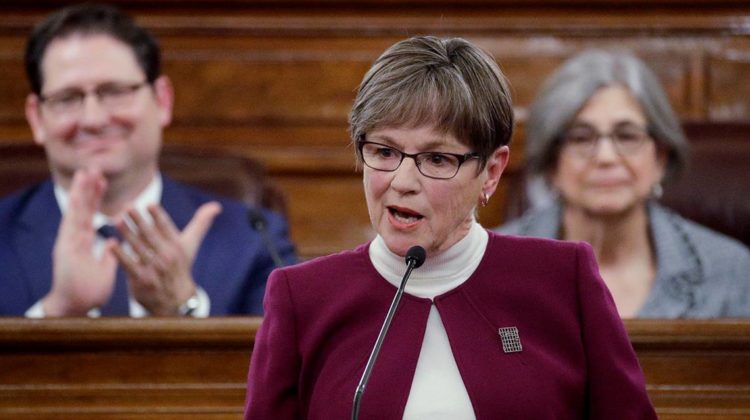
Gov. Laura Kelly Photo Credit: Kansas City Star.
On Thursday June, 24th, Kansas Gov. Laura Kelly, a Democrat, broke from tradition and granted clemency to eight individuals in the middle of her term. Officials incarcerated three of those individuals for nonviolent cannabis-related offenses.
Clemency and pardons are tremendous judicial powers that governors and presidents wield, since they facilitate the early-release of prisoners. Yet they are rarely, if ever, employed by the individuals in those positions of power.
Frequently, clemencies are issued in sudden calculated bursts by politicians that are departing from office. Such as former President Obama who granted clemency to 330 non-violent drug offenders in a single day on the eve of Trump’s inauguration. Trump also commuted nearly 100 sentences in his final hours in office.
Clemency: The Apex of Power
There is almost nothing that rivals the power of having the legal capacity to commute or pardon prison sentences. The ability to grant clemency can prevent someone from serving a life-sentence, or from being executed by the state in instances of capital punishment.
Governor’s have the authority to dispatch clemency for convictions in the state that they represent. For example, the President has the authority to issue clemency for federal convictions, according to the Center for American Progress.
Although governors and presidents have the power to issue clemencies, including pardons and commutations, there are subtle differences between the different forms of clemencies.
Clemency is the general term used to denote any reduction of a criminal conviction, according to the Department of Justice (DOJ). More specifically, a pardon is a form of clemency where officials relieve an individual of all consequences of their conviction, including clearing their criminal record. Pardons are ordinarily used for those that were either punished too severely for the crime they committed or were wrongly convicted.
A commutation is another form of clemency that is applied when an individual’s sentence is too long or maligned with the crime at hand.
The Three Commutations for Cannabis-Related Offences
Kansas Gov. Kelly commuted Joseph Agrillo, Dominic Holder and Loren Thibodo sentences for cannabis-related crimes. This means that officials released them from prison, but did not clear their records of the convictions.
The state of Kansas charged all three people — Agrillo, Holder and Thibodo — with possession with intent to distribute cannabis, reports WIBW News.
At the time of his release, Agrillo was serving a four-and-a-half-year sentence for possession of less than an ounce of cannabis (25 grams) with three years of post-release-probation, according to the Last Prisoner Project.
Officials sentenced Holder to eight years in prison for transporting 44-pounds of cannabis through Kansas in 2018, reports Hutch News.
There was no available information on the length of Loren Thibodo’s sentence. But public records show that officials convicted him on intent to distribute between 25 and 450 grams of cannabis.
Gov. Kelly only granted them commutations and not full pardons. As a result, their criminal records and convictions will remain. So, Agrillo, Holder and Thibodo will all remain felons and will have their rights circumscribed because they were all convicted of intent to distribute more than 25 grams of cannabis.
The Remaining Five Granted Clemency
Out of the remaining five who Gov. Kelly granted clemency for non-cannabis-related convictions, three were full pardons and two were commutations.
The Governor’s office granted full pardons to Joshua Townsend, Chivonda Hall and Xuan Hiep Le for various crimes. Those include possession of drug paraphernalia, DUIs and aggravated robbery, respectively.
Gov. Kelly gave Le, Townsend and Hall full pardons for specific reasons. For instance, Le is an immigrant from Vietnam that wanted to apply for citizenship and needed a clear record; Townsend wanted to become a police officer; and Hall wanted to become a nurse. They had all already completed their sentences, according to the Kansas City Star.
The two non-cannabis-related commutations were for Michael McCloud and Jordan A. Jones. Officials convicted Mcloud of aggravated robbery, and Jordan A. Jones, for intent to distribute narcotics.
Isolated Relief for Specific Individuals
Those who committed potentially harmful crimes, such as robberies or DUIs, had demonstrated rehabilitation and deep personal change. The Kansas City Star reports that Mcloud (who officials convicted of aggravated robbery) organized donations for a local shelter and even dressed as Santa Claus for families that visited the prison.
The state convicted the rest for innocuous crimes, such as possession with intent to distribute cannabis.
Yet, there are still at least 1,500 people in prison for non-violent drug offenses in Kansas, according to the Kansas Sentencing Commission.
So, while those who the governor granted clemency to surely feel a significant source of relief, there are still thousands of people — in Gov. Kelly’s state — who are liberty-deprived because of non-violent drug-charges.



Leave a Reply